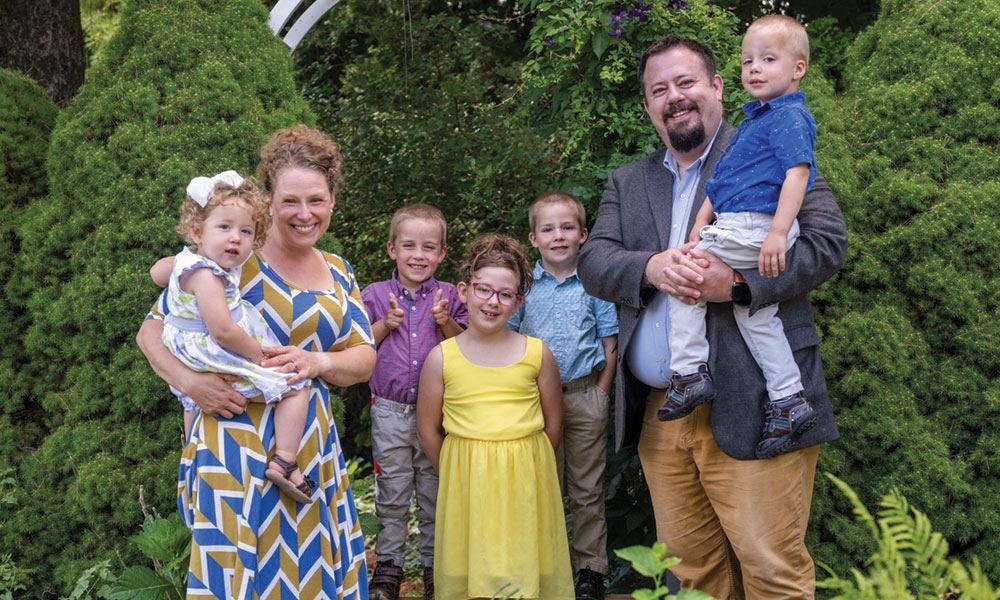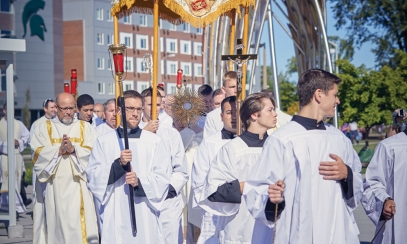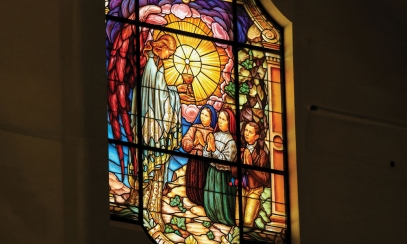
Waiting for God
Getting your Trinity Audio player ready...I am of the firm conviction that any parent who has attempted to bring several small children to Sunday Mass should get an automatic pass to heaven upon the end of their lives. As parents, we know that we are the primary educators of our children and for them to learn their faith, they’ve got to practice it — most especially, practice it with us. But then the game of “see how many hymnals I can stack” begins, or the silent kicking fight between siblings commences, or my favorite, the decidedly not whispered “WHEN IS THIS GOING TO BE OVER?” questions as you pray that Father didn’t hear. The weekly occurrence of these and other “adventures” becomes such a regular experience that when an authentic expression of prayer comes from one of your children, it catches you by surprise.
I am of the firm conviction that any parent who has attempted to bring several small children to Sunday Mass should get an automatic pass to heaven upon the end of their lives. As parents, we know that we are the primary educators of our children and for them to learn their faith, they’ve got to practice it — most especially, practice it with us. But then the game of “see how many hymnals I can stack” begins, or the silent kicking fight between siblings commences, or my favorite, the decidedly not whispered “WHEN IS THIS GOING TO BE OVER?” questions as you pray that Father didn’t hear. The weekly occurrence of these and other “adventures” becomes such a regular experience that when an authentic expression of prayer comes from one of your children, it catches you by surprise.
Three weeks ago, as the consecration of the Mass was taking place, I heard my 5-year-old say something under his breath. I thought he was fooling with a nearby sibling, so I reminded him to pay attention to what was transpiring at the altar. Then the consecration of the Precious Blood took place, and I heard him muttering something again. This time, it occurred to me that he was speaking a prayer and so I asked him what he was saying. He matter-of-factly stated, “Dear God, come here, I love you.”
No one taught him to pray that. It was an authentic expression of his desire to receive Jesus in the Eucharist, which he has not yet been able to because of his age. Needless to say, I was moved by the profundity of this desire, and it sparked in me some self-reflection about my own desire for God.
Scripture is full of passages telling us to desire God. Jesus tells us to “ask, seek, knock.” The old law commands us to “love the Lord your God with all your heart, and with all your soul, and with all your might.” But, while those and other passages are crucial to developing our relationship with God, I believe the psalms illustrate best what desire for God looks like.
Psalm 42 has the classic image of the deer longing for “running streams.” The psalmist continues, “My soul thirsts for God, for the living God. When shall I come and behold the face of God?” We’ve all seen deer running and leaping in a field, you can imagine that they work up a bit of a thirst, especially on a hot day. Who hasn’t had the experience of doing yard work on a hot July day followed by the sweet satisfaction of the glass of iced lemonade? The psalmist is leaning into that experience as an expression of what his soul feels like without God.
Then there’s Psalm 63, which begins, “O God, you are my God, I seek you, my soul thirsts for you; my flesh faints for you, as in a dry and weary land where no water is …” This intensifies the image beyond mere thirst, this man is at the point of passing out he is so parched. The dry desert land where the ground is literally cracking from lack of moisture, the land, he says, is “weary.” And yet, I have to ask myself, have I ever really felt like that in relation to God? Have I ever cultivated within myself a desire so real that it could be described as weary thirst? Do I recognize within me the restlessness St. Augustine speaks of when he declares that the heart is restless until it rests in the Heart of God?
Restlessness is good. Desire is good. Thirst is good. These drive us to seek out what we need, what we’re dying for. They speak to us and give us clarity about what is needed. If we never feel like this for God, our desires need fixing.
This is what the great gift of Advent is all about. The word itself means something like “to come.” It’s about the LORD’s coming, but if we don’t cultivate a desire for that coming, we’ll miss out when it finally happens. This isn’t a grinchy exhortation against Christmas music, rather, it’s a question: “How am I taking advantage of this season of anticipation to cultivate desire in my and my family’s hearts for the coming of the Lord?”
There are many traditional ways families do this. There’s the Advent wreath, Advent calendar, songs, and prayers which focus on the coming of the LORD, such as Oh Come Divine Messiah, O Come O Come Emmanuel, and Come, Thou Long Expected Jesus. Maybe it includes attending a Lessons and Carols event at a nearby church, preparing your heart in the sacrament of confession, or attending extra Masses during the season, such as on Saturday morning or another time during the week. Maybe it's volunteering at the local soup kitchen or food pantry to spread God’s light to individuals there. There’s no right or wrong way, you can even invent your own practices. In my family, we put the tree up on the first Sunday of Advent, but we don’t decorate it. Instead, we read sections of the Old Testament history and prophets who expressed Israel’s desire for her savior. Finally, as if the tree itself is bursting forth in anticipation, we decorate it with lights and glass bulbs on Christmas Eve.
God loves you, and just like any lover, he wants you to love him back. Use this season to cultivate that love, that desire, in return.



